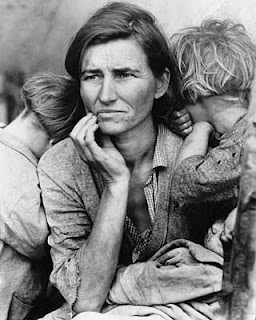For the past couple of days I've been immersed in writing a lecture about the psychology of imagery. It is a broad and extensive topic.
In the lecture I discuss the impact that photography and media have had on social awareness in the past: child-labor reform, the modern civil rights movement; the documentary style and structure of the Farm Securities Administration; war photography (from the censorship of WWI through current day usage and the dangers of "compassion fatigue"); how advertising plays on anxiety and offers palliates; the illusion of perfection in fashion; how paparazzi and the media culture we currently live in affect celebrity, and of course: the digital revolution.
 |
| Lewis Hine |
In the lecture I discuss the impact that photography and media have had on social awareness in the past: child-labor reform, the modern civil rights movement; the documentary style and structure of the Farm Securities Administration; war photography (from the censorship of WWI through current day usage and the dangers of "compassion fatigue"); how advertising plays on anxiety and offers palliates; the illusion of perfection in fashion; how paparazzi and the media culture we currently live in affect celebrity, and of course: the digital revolution.
 |
| Dorothea Lange |
The lecture relies heavily on past examples. My questions regarding the future of photography are, with the speed in which information is disseminated and images dispersed in this media culture, how, in the upcoming years, will we separate the craftsmen of the industry from the people with cameras?
Colleges that teach photography are quickly getting rid of film and darkrooms (are there any left?) and the science of light is being replaced by the technology of capture. Not to say that the technology isn't amazing, but is it enough? Are students of photography making an image with subject and light, or with a computer? The lessons learned through printing black and white are, in my mind, invaluable, but they may also be obsolete.
 |
| Richard Avedon |
Are we creating a generation of 'pro-sumers' that sell images on Flickr to Getty and work for nothing, continually watering down the talent pool in the industry? A bunch of one hit wonders? I regard photography as a tool and an art form and have learned an incredible amount from those we refer to as the Masters. There aren't many left and I'm not sure we are helping any along. There is a gap in the industry and I only see it growing.

